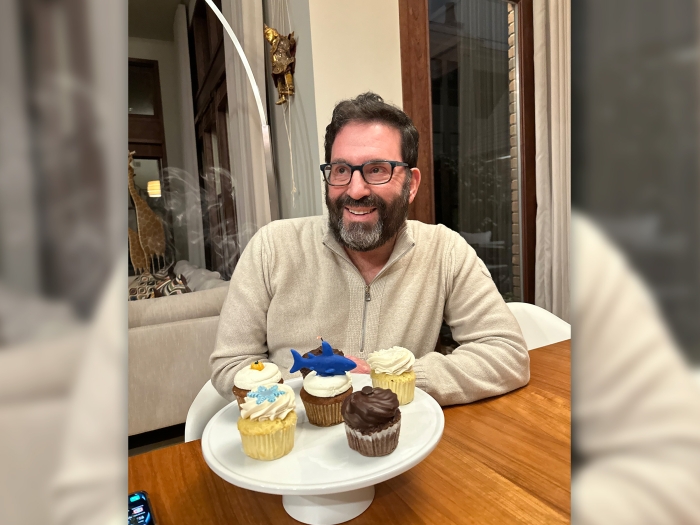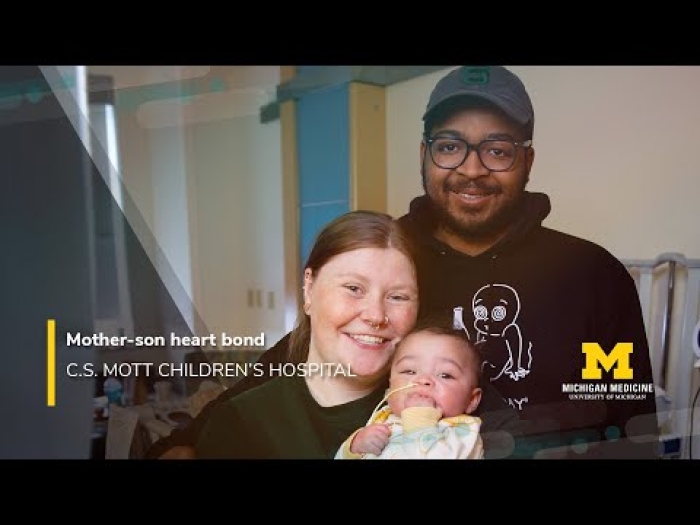A young patient with a fatal heart condition gets the chance to see his former organ up close.
1:00 PM
Author |
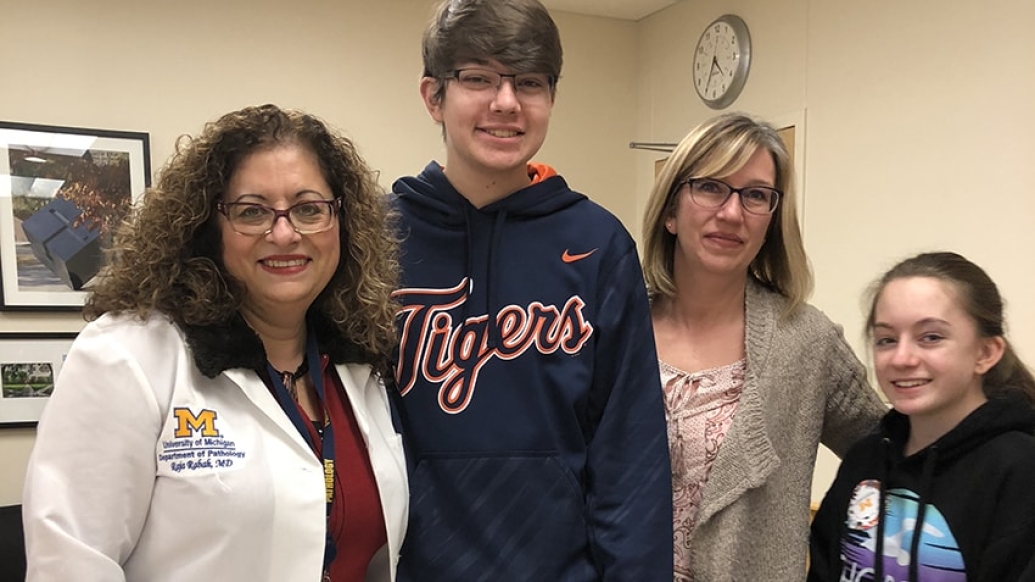
Inside the blue, toolbox-sized container resting on top of a large conference table was doctors' biggest clue to what had gone wrong inside their young patient's body.
MORE FROM THE LAB: Subscribe to our weekly newsletter
A pathologist slowly opened the box, unzipping a bag and peeling back tissue paper to reveal a gray, grapefruit-sized human heart — one almost twice the size it should have been.
Most of the nearly 20 people in the room were the regular teams at University of Michigan's C.S. Mott Children's Hospital who routinely examined failed hearts at teaching conferences, including pediatric cardiologists, pathologists, nurses and trainees.
But on this day, a special guest also attended: the heart's owner.
Justin Prybyla sat among clinicians along with his mother, younger sister and two sets of grandparents. The 17-year-old watched multiple experts review his case, presenting slide after slide describing details of what appeared to cause his heart to suddenly stop working correctly the summer before his senior year of high school.
One microscopic image showed the pink spots representing damage from what doctors believe was a virus attack with large chunks of blue in between — areas where his immune system seemingly attempted to fight back.
Then, he watched as Mott specialists picked his old heart right off the table. It was the next best thing to his original wish after his heart transplant in fall 2017: to take his first heart home and save it in a jar on his shelf.
"No one ever gets to see their own heart and mine was out of me, so why not?" Justin says. "I didn't know what to expect.
"I think some people might get creeped out, but I thought it was pretty cool."
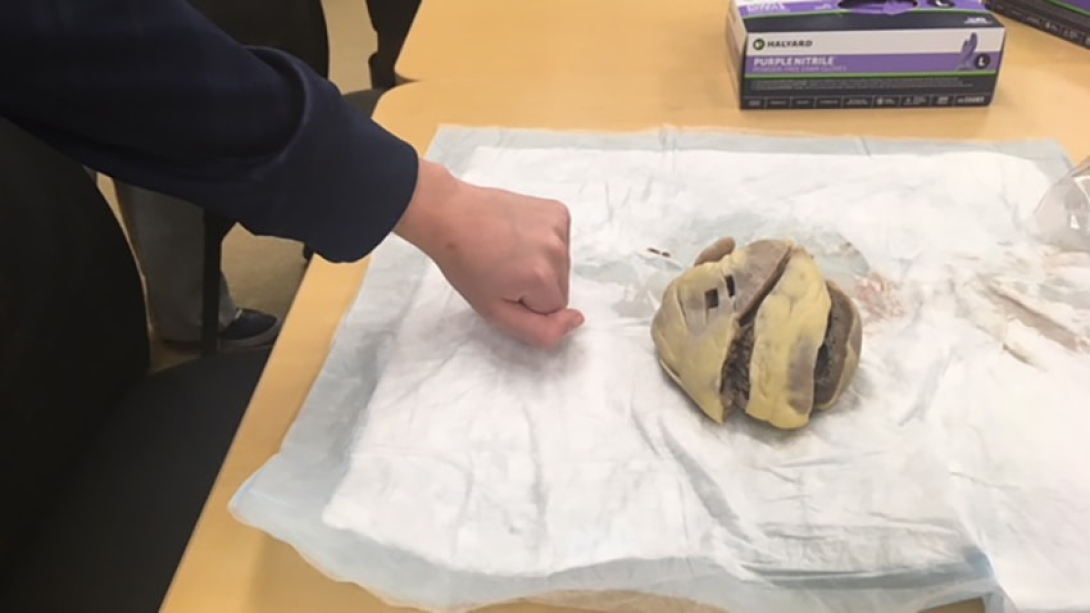
Up close and personal
Justin is among a handful of pediatric heart patients who, after expressing interest in seeing their old heart in the flesh, have been offered the opportunity to do just that.
SEE ALSO: The Heart You Take with You
After all, the defunct organs receive lots of scrutiny.
"The heart goes to pathology for review, where they make a report and then present what they learned. This is a really important educational opportunity for us to learn more about what made the heart sick and information that could possibly help another patient in the future," says Mott pediatric cardiologist Kurt Schumacher, M.D.
"It's definitely unusual for a patient to come to these meetings, but it's something we'd like to offer to more families who have that interest," he adds. "This is not for everyone but for the right patient, it could be a really interesting experience."
Other patients have actually picked up and felt their own old heart. But Justin and his family members opted to simply observe from a few feet away, watching others pass it around.
"It was so bizarre to see his heart sitting there in the middle of the table with him standing right next to it," says his mother, Margaret. "Here was this thing inside his body that almost killed him — and we were looking at it in person."
A sudden diagnosis
Justin had never had any health issues until last summer when he noticed shortness of breath laying down, frequent sluggishness and a loss of appetite. He already needed a physical exam before the start of the school year, so Justin's mother asked his doctor to move it up.
His mother guessed that maybe he had an iron deficiency or was simply overtired from his outdoor manual labor work. But results of an electrocardiogram concerned his pediatrician, who referred the Romulus, Michigan, family to Mott.
Several more tests over the next few days confirmed shocking news. Justin had developed dilated cardiomyopathy, a condition in which the heart's muscle cells are abnormal or damaged, limiting the organ's ability to pump blood.
Justin's heart was enlarged from inflammation and only pumping a quarter of the amount of blood and oxygen required. Extensive scarring from what appeared to be a virus had caused so much damage it was beyond repair.
There was only one solution — a new heart.
"It was such a whirlwind," Margaret says. "I still can't wrap my head around how we went from having this healthy, active boy to suddenly needing a heart transplant for him to live."
Justin spent some time in the pediatric intensive care unit at Mott but was sent home with medication to keep his blood and oxygen flow healthy. Three weeks later, the family got the highly anticipated call — he had a heart.
Learning opportunity
Justin only had one question when he awoke from transplant surgery.
"Did you take a picture of my heart?" he asked.
When the answer was no, doctors instead promised to look into whether he could have an in-person introduction.
"The clinicians approached me and said, 'This may sound like an odd question, but could we let the patient see his heart?' I said, 'Sure, why not?'" says Raja Rabah, M.D., director of pediatric and perinatal pathology at Mott.
Rabah had been involved with pathology reports on Justin's heart from the beginning of his care at Mott but had never actually met the patient.
"Pathologists are usually behind the scenes, so it was quite the experience to meet the patient in person," she says. "We always aim to offer patient-centered care and this definitely helps patients be closer to the process involving their care."
"This has typically been a learning opportunity for clinicians, fellows and the rest of our teams, but we are seeing that it could also be educational for our patients," she adds.
"We'd like to offer more families the chance to join these conferences to help them better understand the disease affecting them or their loved ones."
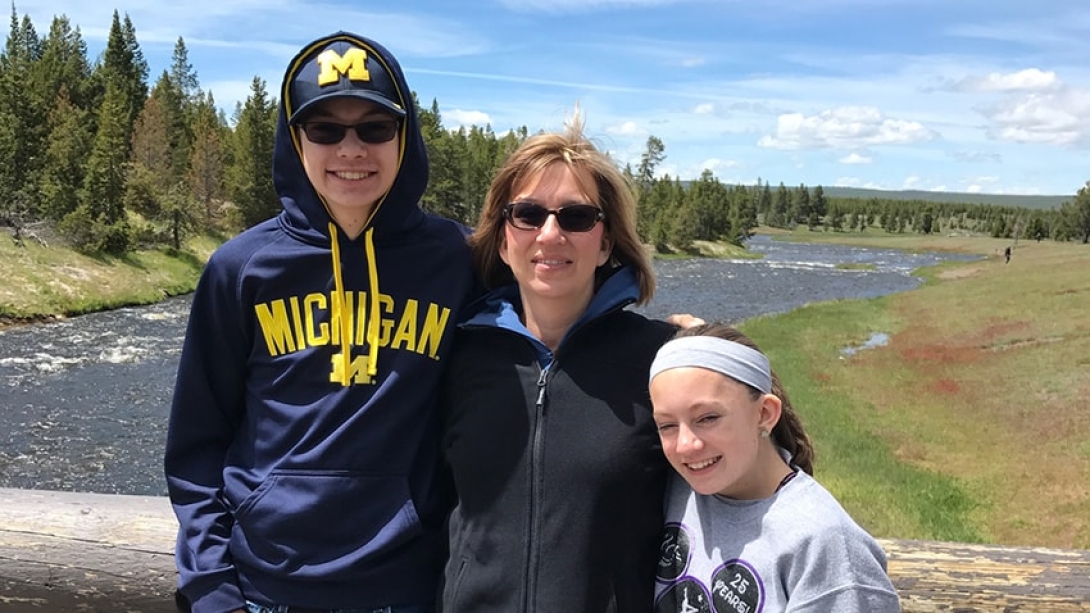
Not missing a beat
Today, Justin is back to his regular self, enjoying previous activities such as bowling. In the spring, he will be taking his first trip post-transplant, traveling to Florida with his mother, sister Nicole and friends from his senior class.
Doctors say the surgery went well and they expect Justin's new heart to keep him healthy for many years to come.
Meanwhile, the unexpected gift has brought gratitude and perspective.
"Organ donation wasn't anything I ever thought about before. You never think it's going to happen to you ... and I didn't know there were so many kids in the hospital waiting for one," he says. "In the hospital I kept wishing I could go back a couple of months when I was healthy.
"Right now, I feel normal and get to do regular things. You take feeling normal for granted."

Explore a variety of health care news & stories by visiting the Health Lab home page for more articles.

Department of Communication at Michigan Medicine
Want top health & research news weekly? Sign up for Health Lab’s newsletters today!




